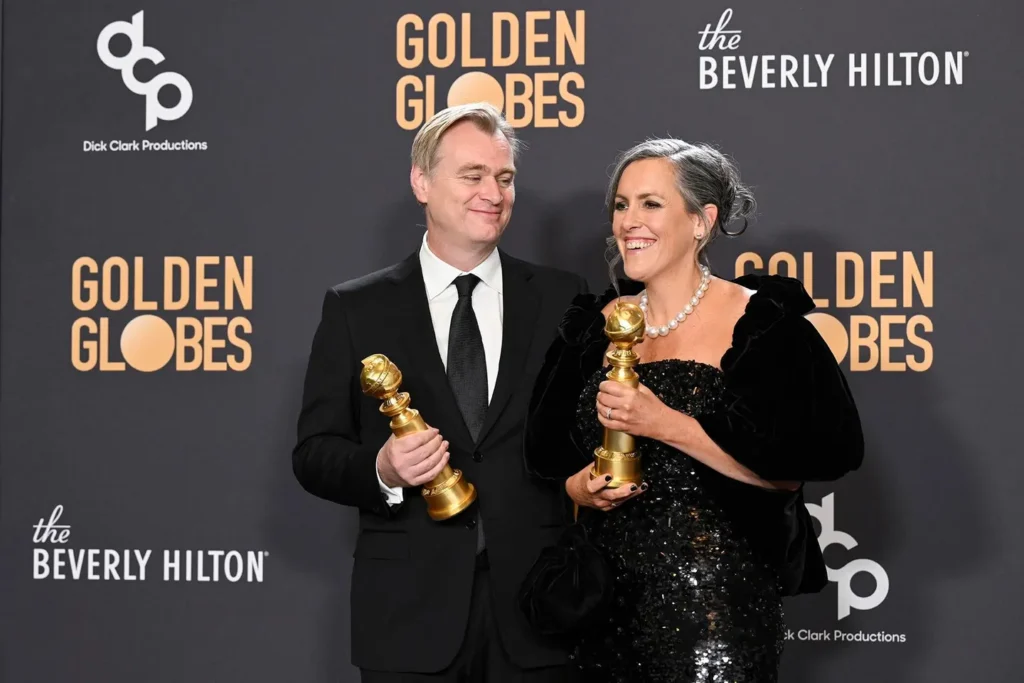Oppenheimer’s success has transformed the upcoming Oscars ceremony from a mere competition into a coronation. Predicted by oddsmakers to sweep the 96th Academy Awards, the atomic bomb biopic is poised to become the highest-grossing Best Picture winner in two decades, trailing only Lord of the Rings: Return of the King and Titanic in terms of global box office earnings, which nearly hit $1 billion. This rare blend of critical acclaim and commercial triumph is set to propel the careers of many involved, solidifying director Christopher Nolan’s position as Hollywood’s most bankable auteur.
Describing Nolan’s stature, one talent manager representing A-listers simply states, “He’s the biggest movie star in the world right now.”
At 53 years old, Nolan is reaping the rewards. Forbes estimates that he is earning 15% of Oppenheimer’s “first-dollar gross,” entitling him to a share of every dollar earned by the film, even before the studio recovers its expenses. Factoring in the box office proceeds, home video sales, and the initial streaming rights alone, Nolan stands to pocket an estimated $72 million pre-tax, after accounting for fees to his agent and lawyer (grossing $85 million). This figure is expected to increase as the film is sold to additional streaming platforms and licensed for future use.

Bomb Squad: Nolan directing "Oppenheimer' star Cillian Murphy, whom he calls one of the great actors of his generation."UNIVERSAL PICTURES/ALAMY
It’s a pinnacle moment in Nolan’s career—a frequent Oscar nominee for directing and screenwriting—who has achieved remarkable success with a three-hour movie, partially shot in black-and-white, delving into the life of a theoretical physicist. Despite his penchant for complex movie concepts, Nolan has mastered the art of creating cinematic spectacles that captivate audiences, whether it’s a Parisian street folding over itself in Inception, traversing a black hole’s event horizon in Interstellar, or witnessing an atomic bomb detonation in Oppenheimer. Every major studio film he has helmed, since his partnership with Warner Bros. commenced with 2002’s Insomnia, has raked in over $100 million at the box office, with six of his last seven films—especially the final two Dark Knight installments—surpassing the $500 million mark (the exception, Tenet, was released amid the pandemic and still grossed an impressive $350 million).
Nolan’s track record solidified his status as a cornerstone of Warner Bros. However, in December 2020, after the studio’s decision to simultaneously release all theatrical releases on its streaming platform, Nolan publicly expressed his disappointment.
“Some of our industry’s biggest filmmakers and most important movie stars went to bed the night before thinking they were working for the greatest movie studio and woke up to find out they were working for the worst streaming service,” he told The Hollywood Reporter, emphasizing, “they don’t even understand what they’re losing.”
The significant loss, as it turned out, was Nolan himself. When it came time to pitch his next project in September 2021, executives from Paramount, Sony, Universal, and Apple were summoned to his Hollywood Hills office to review the Oppenheimer script—Nolan famously keeps his scripts offline—and present their proposals.
With multiple studios vying for the prestigious project, Nolan had the leverage to demand several preconditions for potential partners, including a $100 million production budget (relatively modest, by his standards), an additional $100 million for marketing, full creative control, an extended theatrical release window, a blackout period during which no other studio would release anything before or after his film, and 20 percent of first-dollar gross.
Earning gross points remains the ultimate sign of power in Hollywood. Among actors, this deal term has nearly disappeared, except for a select few veterans like Tom Cruise (who reportedly earned around 12.5% of gross for his latest Mission: Impossible movie). Even for multihyphenate filmmakers, it’s reserved for the top tier of consistent moneymakers—such as Steven Spielberg, James Cameron, and Peter Jackson.
Ultimately, Universal’s studio head Donna Langley agreed to Nolan’s terms and secured Oppenheimer. Sources reveal that Nolan’s deal with Universal included 15% of the gross, slightly less than the 20% he initially sought, though the difference might account for Emma Thomas’ participation—Nolan’s wife and producing partner for over two decades. In the case of first-dollar gross deals, all upfront fees are an advance against the backend participation, but to stay within the proposed budget, Nolan would have had to reduce his guaranteed fees for directing, writing, and producing than he could have otherwise commanded. The deal he struck with Universal was the ultimate bet on himself.

Golden Couple: With 'Oppenheimer,' Nolan and his wife, producer Emma Thomas, have swept Hollywood's awards seasonGILBERT FLORES/GOLDEN GLOBES/GETTY IMAGES
The production of the movie commenced in early 2022, with a scheduled release date set for July 2023. However, Warner Bros. made headlines when it announced that its summer blockbuster, Barbie, would also premiere on the same day—a move perceived by some in Hollywood as a direct response to Nolan’s departure. During a conversation for Variety’s “Actors on Actors” series, Barbie star Margot Robbie disclosed that Oppenheimer producer Chuck Roven had reached out to request rescheduling Barbie’s release date. Robbie’s response was firm: “We’re not moving our date. If you’re hesitant to go up against us, then you adjust your schedule.”
Thus began the phenomenon known as “Barbenheimer”—a manufactured rivalry hyped up by each side’s marketing teams, resulting in global attention. Both Barbie and Oppenheimer emerged as the first and third highest-grossing movies globally in 2023. Oppenheimer raked in over $957 million at the box office, and after theaters took their share (typically around 50%, increasing over time), Nolan was in for a lucrative payday.
Nolan has attained an almost mythical status within the film community, revered as a defender of the cinematic experience. Prior to Oppenheimer’s release, Nolan urged audiences to see the film in IMAX, particularly 70mm IMAX, the format in which the movie was shot (also coincidentally, the priciest ticket). It became the fourth-highest grossing IMAX movie ever, contributing $183.2 million, nearly 20% of the total earnings. Likewise, ahead of the movie’s on-demand and physical release in November, Nolan stressed the importance of owning the film on Blu-ray “so no nefarious streaming service can snatch it from you.” Universal reported selling out of 4K Blu-rays in under a week, scrambling to restock to meet demand.
With Oppenheimer’s immense success both commercially and critically, the competition for Nolan’s next project is poised to be even fiercer. Last year, Variety reported that Warner Bros. issued him a seven-figure royalty check upfront, no strings attached, as an advance against his eventual backend earnings for 2020’s Tenet. The studio also re-released Tenet in theaters (IMAX, naturally), partly to capitalize on the director’s support and partly, undoubtedly, to mend their relationship. “We’re hoping to get Nolan back,” said Warner Bros. co-CEO Michael De Luca to Variety. “I think there’s a world.”
When speculating on Nolan’s next deal, one top entertainment lawyer summed it up succinctly: “Whatever he wants it to be.”

